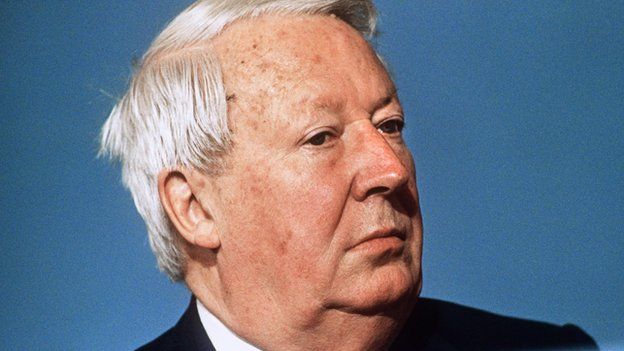Edward Heath: A profile of the former UK prime minister
- Published

Sir Edward Heath became Conservative Party leader more than 50 years ago and served as UK prime minister between 1970 and 1974. He died in 2005 but is in the news now because of claims police failed to pursue child abuse allegations against him. Here is a guide to his life and career.
Early years
Edward Richard George Heath, known as Ted Heath, was born in July 1916 in Broadstairs, Kent, into a working class family, the son of a carpenter and a parlour maid. He gained scholarships to grammar school and to Oxford University, where he studied Philosophy, Politics and Economics.
During his holidays, he travelled across Europe and witnessed at first hand the might of Nazi Germany at Nuremberg in the 1930s.
Route into politics
Heath served in the Royal Artillery during World War Two and worked briefly in the civil service. His pre-war visit to Nazi Germany and his experience of the war shaped his belief in the benefits of what is now the European Union.
In 1950, he became a Conservative member of parliament for Bexley in south-east London, a seat he would represent for 50 years.
Path to the top
Heath rose rapidly through the ranks of government. Jobs included being chief whip in Anthony Eden's government during the Suez crisis and, under Harold Macmillan's government, he was in charge of Britain's attempt to enter the European Community in 1963.
Two years later, he became Conservative Party leader - the first in modern times who was not from an upper-class background. He was also the first Tory to be elected leader by his fellow MPs. Within a year he had lost a general election to his great rival, Labour's Harold Wilson - but was to get his revenge three years later, defying expectations to win a 30-seat majority. Opinion polls had predicted a Labour win.
Prime Minister Heath
Heath took office promising to be tough on pay and tough on trade unions, and it was battles with the unions that characterised his four years in Downing Street. There were widespread strikes - no rubbish was collected for six weeks - endless power cuts, a three-day working week and a pay freeze.
With unemployment rising, Heath performed a famous U-turn on economic policy. On the plus side, he fulfilled his long-held ambition of taking Britain into the European Community, in 1973. In 1974, he called an election, with the question, "who governs Britain - the unions or the government?" The answer - a hung Parliament - was inconclusive, and later that year Wilson turned his minority Labour government into a majority in a second election. Heath was replaced by Margaret Thatcher as Conservative Party leader.
Personal life
The lifelong bachelor was famed for his love of music and sailing, in which he competed at international level. He owned a series of yachts called Morning Cloud, winning the Sydney Hobart Race in 1969 and - as prime minister - captained the British team that won the Admiral's Cup in 1971.
As he weathered storms in the Atlantic Ocean, there was criticism of him at home for staying in the race despite a crisis in Northern Ireland. Stepping on to dry land after the race, the prime minister told reporters it had been "a team effort throughout". In 1974, he was devastated when two crew members were killed when Morning Cloud III sank in the English Channel when it was hit by a huge storm.
In quotes
- "We will have to embark on a change so radical, a revolution so quiet and yet so total, that it will go far beyond the programme for a parliament" - October 1970 to the Conservative Party conference
- "I am not a product of privilege. I am a product of opportunity" - 1974
- "You mustn't expect prime ministers to enjoy themselves. If they do, they mustn't show it - the population would be horrified" - November, 1976
- "Do you know what Margaret Thatcher did in her first Budget? Introduced VAT on yachts! It somewhat ruined my retirement" - 1992
Out of office
Heath never forgave Mrs Thatcher for ousting him as leader and refused to serve in her cabinet. When asked in a TV interview if it was true that when Mrs Thatcher was herself deposed he said "rejoice, rejoice," he joked: "I think I said it three times."
Heath remained in Parliament until 2001, becoming Father of the House, the title given to the Commons' longest-serving MP. He came face to face with Saddam Hussein to get British hostages released during the Gulf War in 1990.
When he died, in 2005 aged 89, Lady Thatcher said he was a "political giant" and "in every sense the first modern Conservative leader". His former home, Arundells, in Salisbury, was left to the nation and was first opened to the public in 2008.